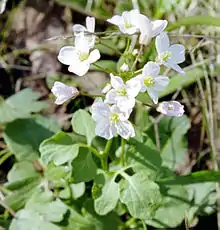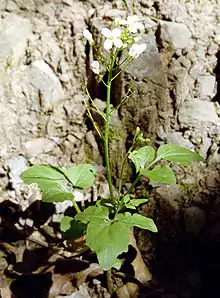Cardamine californica
Cardamine californica, or milkmaids, is a flowering plant in the family Brassicaceae, native to western North America from Washington to California and Baja California. It is common in a variety of habitats including shady slopes, open woodlands, chaparral and grasslands in the winter and early spring. In the San Francisco Bay Area, it is one of the first wildflowers to bloom, with blossoms from January to May.[1]
| Cardamine californica | |
|---|---|
 | |
 | |
| Scientific classification | |
| Kingdom: | Plantae |
| Clade: | Tracheophytes |
| Clade: | Angiosperms |
| Clade: | Eudicots |
| Clade: | Rosids |
| Order: | Brassicales |
| Family: | Brassicaceae |
| Genus: | Cardamine |
| Species: | C. californica |
| Binomial name | |
| Cardamine californica | |
| Synonyms | |
|
Dentaria californica Nutt. | |
Description
Cardamine californica is an herbaceous perennial plant growing to about 1 foot tall. The flowers are borne on a raceme inflorescence, each flower about 1/2 inch in diameter with four white to pink petals. The flower closes its petals in late afternoon as the sun goes down and nods its pedicel before a rain, protecting the pollen.[1]
Hand pollination of two milkmaids populations in the San Francisco Presidio improved seed set from 8% to 85%, with seeds ripening in about 53 days.[1]
References
- Kazuki Ariyoshi; Emily Magnaghi; Mark Frey (Fall 2006). "Hand-Pollination of Cardamine californica Improves Seed Set". Native Plants Journal. 7 (3): 248–252. doi:10.1353/npj.2007.0000. S2CID 83759121. Retrieved 2013-02-19.
Sources
- "Wildflowers of Henry W. Coe State Park" brochure, Larry Ulrich, 2002
External links
- Photo of Milkmaids in Henry Coe State Park
- Jepson Manual Treatment - Cardamine californica
- USDA Plants Profile; Cardamine californica
- Cardamine californica - Photo gallery